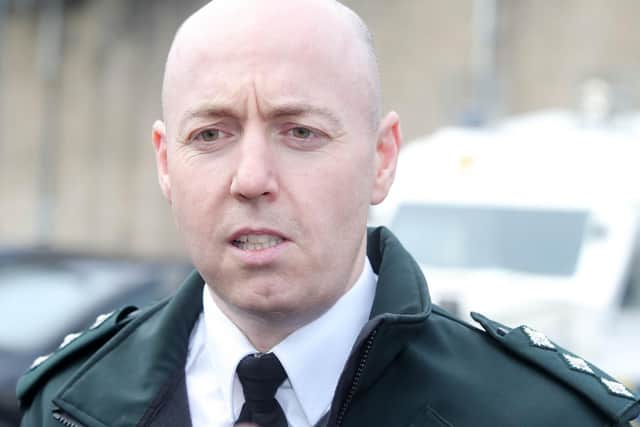Jon Burrows: Urgent need for transformation in police leadership that better supports officers


I outlined how officers were being worn down by unsupportive leadership and a toxic culture of fear, at the heart of which was a punitive and painstakingly slow misconduct regime.
In a difficult and dangerous job like policing, knowing that so long as you are hard working and honest you will be supported is vital to being able to make decisions at work and switch off at home. A culture of blame cultivates risk aversion and anxiety.
Advertisement
Hide AdAdvertisement
Hide AdOfficers feared being sacrificed for political expediency, by their leadership who appeared unable to defend honest policing in a political storm. A barrage of often misinformed media criticism, which could easily be rebutted, was invariably met with either silence or a limp holding statement.


I also warned that a strong feeling of organisational injustice in the PSNI was eating through morale like acid - nothing rankles more with human beings than unfairness.
The rank and file believed that the wrongdoings of senior officers were treated as opportunities to learn, whereas trivial errors by junior officers were punished.
I spoke out in 2022 because I feared for my former colleagues and the future of the PSNI. The lights on the dashboard were flashing red for years, but the Policing Board were asleep at the wheel, renewing the last chief constable’s contract whilst the organisation was in free fall.
Advertisement
Hide AdAdvertisement
Hide AdWhen Simon Byrne resigned after the High Court declared that the politically motivated treatment of two junior officers in 2021 was unlawful, the rank and file dared to hope that real internal change was possible. This was reinforced, when a chastened Policing Board, which seemed all at sea in the autumn, announced a review into its own effectiveness and of the senior police leadership culture.
However, six months later I fear that the opportunity for a hard reset in policing here is being squandered.
The rank and file are understandably incensed by news that DCC Mark Hamilton, who went sick shortly after the High Court judgement, has been granted a 10-month secondment to the Department of Justice on his full £200,000 salary. When rank and file officers go sick, they are robustly managed under an absence policy, receiving written warnings and automatically placed on half pay after six months.
It has become a touchstone for basic fairness in the PSNI, that the Deputy Chief Constable, who was the final decision maker for officers’ half pay extension applications, now benefits from an unprecedented secondment opportunity on full pay. It transpires that the Policing Board doesn’t even have a sickness policy for the chief officers they employ.
Advertisement
Hide AdAdvertisement
Hide AdIt also transpires that no one will be investigated for the unlawful and politically motivated mistreatment of the two officers. After the Ombudsman and Policing Board declined to investigate, I wrote to the PSNI requesting that an outside police service investigate allegations of wrongdoing. The PSNI wrote to me last week, confirming that no investigation will take place. The sense of double standards is as strong as ever.
The law-abiding police officer who was unlawfully suspended is still fighting for fairness. The last chief constable, in an unprecedented intervention, overruled a decision by his own professional standards department not to take any disciplinary action against the officer after they reviewed the misconduct investigation. The new chief constable should have decisively ended this affront to natural justice, but the saga rumbles on.
The PSNI bashing in the media continues unchecked. The PSNI were duty bound to investigate the allegation of an unnotified procession by the Bloody Sunday families and put the facts before the PPS. However, no one in the PSNI checked the dangerous narrative that this was politicised and heavy-handed policing.
It took me months to obtain the total arrest and prosecution figures for the investigation into the Pitt Park incident in 2021. A total of 22 people were arrested by the PSNI and 19 reported to the PPS, whereas the only person arrested after the Ormeau Road incident a few days later was released from the back of a police car.
Advertisement
Hide AdAdvertisement
Hide AdThe persistent allegations that the PSNI engaged in two tier policing in favour of loyalists was easily rebutted – but it wasn’t. The failure to defend the honour of the PSNI demoralises its members, who risk their lives for society.
Unfortunately, there are also indications the Policing Board won’t face the radical reform needed. The board’s management confirmed to me last week that the review announced six months ago hasn’t even been commissioned yet. This demonstrates a complete lack of urgency and acceptance of the need for fundamental reform. The delay is unjustifiable.
The PSNI now has 1,150 fewer officers than the Patten Report recommended, despite significant population growth. Sixty officers leave the PSNI every month and probationary officer resignations up are 400 % from five years ago. Fifty officers have applied to transfer to the Australian police, previously only a handful responded to such adverts.
Often up to 600 officers are off sick daily; nearly twice the number that was declared unsustainable in 2016. Over 1,000 officers are medically unfit for a full range of duties and last year 200 applied for medical retirement, a 100% increase in the year before. Stress and psychological illness are the predominant medical issues amongst a demoralised workforce.
Advertisement
Hide AdAdvertisement
Hide AdThere needs to be a transformation in police leadership that better supports officers and resets the police narrative, combined with major reform of the police accountability bodies. Winston Churchill once said a good crisis should never go to waste; without swift action that is what will happen.
Jon Burrows is a retired senior PSNI officer